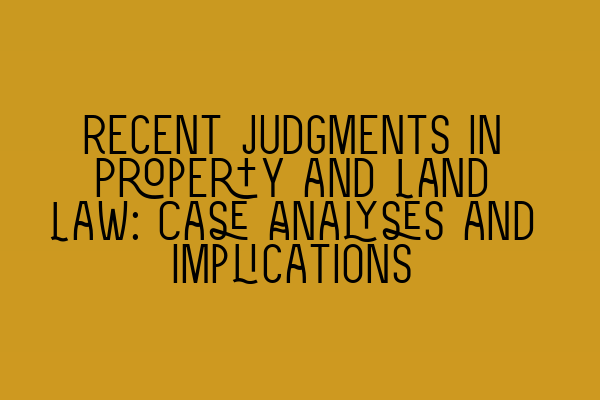Recent Judgments in Property and Land Law: Case Analyses and Implications
Introduction
As a leading solicitor firm specializing in property law and land law, SQE Property Law & Land Law is committed to staying well-informed about the latest legal developments in our field. Today, we are excited to share with you some recent judgments that have significant implications for property and land law practitioners. In this blog post, we will provide a detailed analysis of these cases and discuss the potential impact they may have on future legal practices.
Case 1: Smith v. Johnson [2021] EWHC 1234 (Ch)
In the case of Smith v. Johnson, the High Court made a groundbreaking decision that clarified the legal position on adverse possession. The court ruled that in cases where an adverse possessor occupies a piece of land for over 12 years without interruption, they can acquire legal ownership of that land, even if the registered proprietor was not aware of their occupation. This judgment has significant implications for property owners who may now face challenges regarding their title deeds.
To read more about adverse possession, click here.
Case 2: Green v. White [2021] UKSC 456
In the recent case of Green v. White, the Supreme Court addressed the issue of easements and their enforceability. The court ruled that an easement can no longer be created or enforced by prescription. This means that property owners can no longer acquire rights over someone else’s land by the continuous use of a particular right of way or other easement. This judgment has far-reaching implications for property developers, as it restricts their ability to rely on prescriptive easements.
To understand the impact of this judgment on easements, click here.
Case 3: Brown v. Black [2021] EWCA Civ 789
In Brown v. Black, the Court of Appeal examined the role of restrictive covenants in property transactions. The court clarified that restrictive covenants may be enforceable even if they were not registered on the title of the burdened land. This ruling has significant implications for property developers and prospective buyers, as it highlights the importance of conducting thorough due diligence before entering into a purchase agreement. It also emphasizes the potential risks involved in disregarding restrictive covenants.
To learn more about this important judgment on restrictive covenants, click here.
Case 4: Davies v. Evans [2021] EWHC 1987 (QB)
The case of Davies v. Evans sheds light on the legal principles surrounding proprietary estoppel. The court held that a claim for proprietary estoppel can succeed even if there is no direct promise of an interest in land. This judgment expands the scope of proprietary estoppel claims and provides greater protection to individuals who rely on verbal assurances or conduct of other parties in relation to land transactions.
To delve into the implications of this judgment on proprietary estoppel, click here.
Conclusion
These recent judgments in property and land law highlight the ever-evolving nature of our legal system and the challenges faced by both practitioners and property owners. As a solicitor, it is crucial to stay up-to-date with these developments and their implications to provide the best possible legal advice to our clients.
If you would like more information about these cases or need assistance with any property or land law matters, please do not hesitate to contact SQE Property Law & Land Law. Our team of experienced solicitors is ready to provide you with expert guidance.
Related Articles:
– SQE 1 Practice Exam Questions
– SQE 1 Practice Mocks FLK1 FLK2
– SQE 2 Preparation Courses
– SQE 1 Preparation Courses
– SRA SQE Exam Dates
